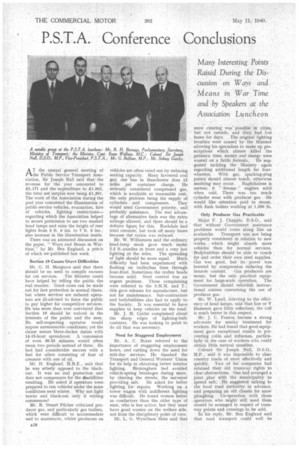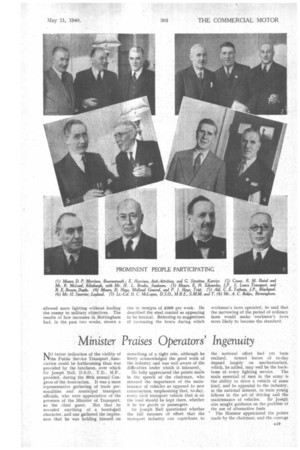P.S.T.A, Conference Conclusions
Page 20

Page 21

If you've noticed an error in this article please click here to report it so we can fix it.
Many. Interesting Points Raised During the Discussion on Ways and Means in War Time and by Speakers at the Association Luncheon AA T the annual general meeting of the Public Service Transport Association, Sir Joseph Nall said that the revenue for the year amounted to £1,171 and the expenditure to £1,062, the total net surplus now being £1.391. The work of the Association during the past year concerned the illumination of public-service vehicles, evacuation, hire of vehicles, lighting restrictions— regarding which the Association helped to secure permission to use two masked head lamps and raise the height of rear lights from 3 ft. 6 ins. to 7 ft. 6 ins., also increase in the illumination inside.
There was an animated discussion on the paper, "Ways and Means in Wartime," by Mr. Ben England, a precis of which we published last week.
Section 19 Causes Grave Difficulties Mr. G. 11. Margrave said that there should be no need to compile excuses for cut services. The Minister could have helped by telling the public the real reasons. Good cases can be made out for fare protection in normal times, but where services are reduced operators are ill-advised to force the public to pay higher for competitive services. He was more than ever convinced that Section 19 should be waived in the interests of the public and the men. No self-respecting . operator would impose unreasonable conditions; yet the clause means Three-decker duties with 14-15-hour spreadover. A •concession of even 30-35 minutes would often mean two periods instead of three. He had had considerable success with a fuel for oilers consisting of four of creosote with one of oil.
Mr. H. England, M.B.E., said that he was utterly opposed to the blackout. It was no real protection and does not compensate for the disabilities resulting. He asked if operators were prepared to run vehicles under the same conditions next winter. Why not light towns and black-out only if raiding commences?
Mr. R. Stuart Filcher criticized producer gas, and particularly gas trailers, which were difficult to accommodate and to manceuvre, whilst producers on
vehicles are often ruled out by reducing seating capacity. Many favoured coal gas; one bus in Manchester does 15 miles per container charge. He seriously considered compressed gas, which is available at reasonable cost, the only problem being the supply of cylinders and compressors. They would need Government priority, and probably assistance. The real advantage of alternative fuels was the extra mileage allowed, and there should be a definite figure for this. Rochdale had tried creosote, but took off many buses
because the ration was reduced. • Mr. W. Williamson said the ordinary head-lamp mask gave much under 2.5 ft.-candles in front and a very low lighting at the sides, The spreading of light should be more equal. Much difficulty had been experienced with flashing on trolleybus lines through hoar-frost. Sometimes the trolley heads became solid. Steel control was an urgent problem. Those complaining were referred to the S.M.M. and T,; this gave releases for manufacture, but not for maintenance. Sub-contractors and bodybuilders also had to apply to the Society. It was essential to have supplies to keep vehicles on the road.
Mr, J. M. Calder complained about the sharp edges of lighting-bulb canisters. He was looking to paint to do all that was necessary.
Need for Staggered Employment
Mr. A. C. Baker referred to the importance of staggering employment hours, and cutting down the need for mid-day services. He thanked the Transport and General Workers' Union for its help in obtaining better interior lighting. Birmingham had avoided vehicle-spring breakages during snow, by clearing the streets, the surveyor providing salt. He asked for better lighting for repairs. Working on a tower wagon with indifferent lighting was difficult. He found women better as conductors than the older type of man, who is less active, but they must have good women on the welfare side, not from the disciplinary point of view.
Mr. L. G. Wyndham Shire said that
snow clearing was' possible in cities, but not outside, and they, bad lost buses for days. The original lighting troubles were caused by the Minister allowing his specialists to make up prescriptioni which almost killed the patients; time, money and energy were wasted on a futile formula. He suggested tackling the Ministry again regarding additional length for fourwheelers. With gas, sparking-plug points should almost touch, otherwise misfiring may occur. Naphthalene is useless; it " freezes " engines solid when cold, There was too much cylinder, wear with producer gas. He would like attention paid to steam, with flash boilers working at 1,500 lb.
Only Producer Gas Practicable Major F. J. Chapple, D.S.O., said that without Government assistance problems would comealong like an avalanche, Transport was not being properly considered in relation to new works, which might absorb more vehicles than for normal services. Bodybuilders should be able to vouch for and order their own steel supplies. Cas was good, • but its power was lowered by compression reducing the benzoic content. Gas producers are messy, but the only practical equipment for large-scale operation. The Government should establish instructional centres concerning the use of producer gas. .
Mr. W. Lund, referring to the efficiency of head lamps, said that line or V filaments gave little reflection; the coil is much better in this respect. •
Mr. J. C. Fenton became a strong advocate for sunray treatment for workers. He had found that good equipment gave exceptional results in preventing colds and influenza, particularly in the case of workers who could obtain little natural sunshine.
Colonel Sir Joseph Nall, D.S.O., M.P., said it was impossible to clear country roads of snow effectively and quickly. Two of his companies had retained their old tramway rights to clear obstructions. One had arranged a joint plan with 'the municipality to spread salt. He suggested talking to the local road authority in advance, and preparing an old chassis for snow ploughing. Co-operation with those operators who might still need them should be arranged in respect of tramway points and crossings to be sold.
In his reply, Mr. Ben England said that road transport could well be allowed more lighting without leading the enemy to military objectives. The results of fare increases in Nottingham had, in the past two weeks, shown a rise in receipts of 4500 per week. He described the steel control as appearing to be farcical. Referring to suggestions of increasing the hours during which workmen's fares operated, he said that the narrowing of the period of ordinary fares would make workmen's fares more likely to become the standard.




























































